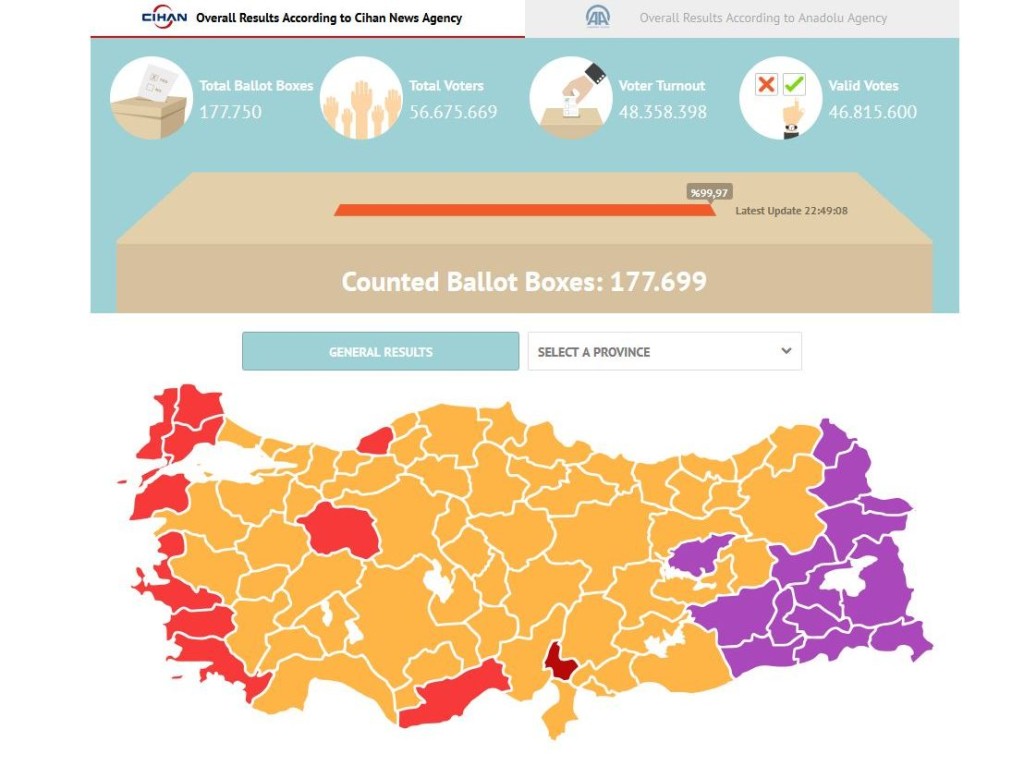Let’s pause in the ongoing discussion about the perilous state of US democracy in 2016 to focus on how far and how fast Turkish democracy has fallen.
Wrongo visited Istanbul in March 2013. At that point, Turkey seemed to be the better example of two Muslim-majority democracies that existed in the world (the other is Indonesia). Then came the Gezi Park demonstrations a few weeks later that left six people dead and 8,000 injured.
In July of this year, Turkey had an aborted coup attempt. In the three and half months since, Turkey has fired or suspended more than 110,000 government employees. They launched a military incursion into Syria, and have repeatedly threatened to do the same in Iraq.
So far, one third of Turkey’s highest-ranking military officers have been dismissed. Almost every major institution—military, judiciary, media, education, business—have been affected. And 170 newspapers, magazines, television stations and news agencies have been shut down, leaving 2,500 journalists unemployed.
Rights groups say the scale of the purges show Erdogan is using the coup attempt to crush all dissent. Erdogan has successfully manipulated the full-throated “patriotism” that the Turkish people showed after the attempted coup to create a constitutional change that would give him near-total executive powers.
The arrest and detention of judges, mayors, teachers, military personnel, civil servants, journalists and political opponents has shown that Erdogan is moving even further away from a pluralistic society.
On October 29, Turkey celebrated the 93rd anniversary of the founding of the Republic, but just two days later, the 92-year-old newspaper Cumhuriyet (The Republic) became the latest target in a crackdown on opposition media. The government continues to use the state of emergency following the July 15 coup attempt as a pretext for silencing Turkey’s few remaining critical voices.
The Istanbul prosecutor’s office said the staff at the paper were suspected of committing crimes on behalf of Kurdish militants and the network of Fethullah Gulen, the U.S.-based cleric that Erdogan accuses of masterminding the July 15 coup attempt. The HuffPo reported that the state-run Anadolu agency said: (emphasis by the Wrongologist)
Journalists at the paper were suspected of seeking to precipitate the coup through “subliminal messages” in their columns before it happened,
Accused of using “subliminal messages.” This is the code language of authoritarian rule. Say goodbye to a democratic Turkey, it’s Erdogan’s country now. Such a sad turn for a nation full of bright and interesting people.
But it doesn’t end there. This week, also saw the State Department tell US Consulate family members to leave Turkey. The State Department has ordered the families to leave Turkey due to increased threats from extremist groups targeting US citizens.
Erdogan’s increasingly bellicose stance on the world stage has alarmed NATO (Turkey is a member) and the US, since it is becoming an ever more unpredictable partner, one over which we have decreasing leverage. From Reuters:
Erdogan warned this month that Turkey “will not wait until the blade is against our bone” in going after its enemies abroad and has hinted at a possible incursion into Iraq if a U.S.-backed assault against Islamic State in the city of Mosul causes sectarian strife which threatens Turkey’s borders. Frustrated that it has not been more involved in the Mosul operation, Sunni Muslim Turkey says it has a responsibility to protect ethnic Turkmen and Sunni Arabs in the area, once part of the Ottoman Empire. It fears Shi’ite militias, which on Saturday joined the offensive west of Mosul, will provoke ethnic bloodletting.
A Turkish ground operation in Iraq would be dangerous, risking embroiling its military on a third front as it pursues an offensive against Islamic State in Syria and against Kurdish PKK militants in its own southeast.
We need to think about how our two US presidential hopefuls would react to this mess once in power.
Whoever wins can’t just sloganeer about what to do with Turkey or about its ambitions in Syria and Iraq, any more than they can ignore what Russia’s and Iran’s objectives are.
Aydin Selcen, a retired Turkish diplomat who was consul general in Erbil, Iraq, the capital of northern Iraq’s autonomous Kurdish region, said:
History is like a huge supermarket where you can find what you want. You can choose a historical perspective created to rally the masses. But you can neither build a foreign policy nor a military strategy based on that…
Hillary Clinton or Donald Trump should stay out of the supermarket of domestic public opinion as well. The answers to dealing with Erdogan and the attack on Turkish democracy while simultaneously dealing with a hostile member of NATO will not be found in “The Art of The Deal.”

